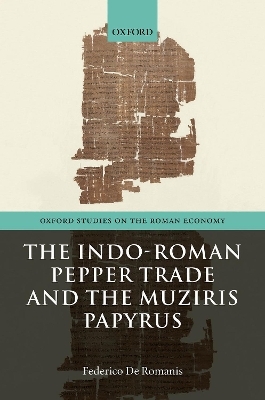
The Indo-Roman Pepper Trade and the Muziris Papyrus
Oxford University Press (Verlag)
978-0-19-884234-7 (ISBN)
This volume presents a systematic and fresh interpretation of a mid-second-century AD papyrus - the so-called Muziris papyrus - which preserves on its two sides fragments of a unique pair of documents: on one side, a loan agreement to finance a commercial enterprise to South India and, on the other, an assessment of the fiscal value of a South Indian cargo imported on a ship named the Hermapollon. The two texts, whose informative potential has long been underexploited, clarify several aspects of the early Roman Empire's trade with South India, including transport logistics, financial and legal elements in the loan agreement funding the commercial enterprise, the trade goods included in the South Indian cargo, and the technicalities of calculating and collecting Roman customs duties on the Indian imports. This study also considers imperial fiscal policy as it related to the South Indian trade, the overall evolution of Rome's trade relations with South India, the structure and organization of South Indian trade stakeholders, and the role played by private tax-collectors. The in-depth analysis sheds new light on this important sector of the Roman economy during the first two centuries AD in two innovative ways: through a balanced consideration of South Indian sources and data, and by drawing comparisons with the pepper trade from late antiquity, the Middle Ages, and early modernity, resulting in a longue durée perspective on the western trade in South Indian pepper.
Federico De Romanis is Associate Professor in Roman History at the Università di Roma "Tor Vergata" in Rome, Italy. He received his doctorate in historical sciences from the Università della Repubblica di S. Marino in 1992 and has taught at the Università di Catania and at the Università della Tuscia, as well as holding fellowships at the Istituto Italiano per gli Studi Storici in Naples (1987-8) and at the Italian Academy for Advanced Studies in America, Columbia University (2012-3). His previous publications include Cassia, cinnamomo, ossidiana: Uomini e merci tra Oceano Indiano e Mediterraneo (L'Erma Di Bretschneider, 1996).
Frontmatter
List of Figures
List of Tables
List of Abbreviations
0: Introduction
0.1. Synopsis
P. Vindob. G 40822: Text and Translation
Part I. Contextualizing the Muziris Papyrus
1: Bridging Disconnected Seas
1.1. Challenges
1.2. The Northern Passages
1.3. The Southern Passages
1.4. Multifaceted Complementarity
2: Riding the Monsoons
2.1. Direct Sea Routes
2.2. Multi-Stage Sea Routes
2.3. Heading for India
2.4. The Pleiades in the Middle of the Yard
3: Pepper Lands
3.1. Kottanarike, the Southern Pepper-Producing Land
3.2. Male, the Northern Pepper-Producing Land
3.3. Early Modern Quantitative Dimensions
3.4. Ancient Prices
4: South Indian Perspectives
4.1. Gatherers
4.2. Traders
4.3. Kings
4.4. The Pepper Pendulum
5: Supporting Sources
5.1. Strabo: The Customs Duties on Indian Commodities
5.2. The Periplus: The Ships and Cargoes of the South India Trade
5.3. Pliny: The Schedule of the Commercial Enterprises to South India
5.4. Ptolemy: The Evolution of the South Indian Context
Part II. Let Him Look to his Bond: A Loan Contract for Muziris (P. Vindob. G 40822 Recto)
6: Deadline and Whereabouts
6.1. A Debated Contract
6.2. Time and Maritime Loans
6.3. The Deadline for Repayment of the Muziris Loan Contracts
6.4. In the Beginning Was the Loan Contract
7: Selling and Repaying
7.1. Repaying a Maritime Loan in Fourth-Century BC Athens
7.2. Under the Lender's Power and Seal
7.3. Earnings and Benefit of Assumption
7.4. Outstanding Loans
8: Loan and Logistics
8.1. What the Loan Was All About
8.2. Prudent Loans for Maritime Trade
8.3. Caravans from Berenice
8.4. The Coptos Ships
8.5. Late Medieval Comparanda
Part III. The Muziris Cargo of a Roman Indiaman (P. Vindob. G 40822 Verso)
9: Three Minor Cargoes and How They Were Assessed
9.1. Three Quarters of an Indiaman's Cargo
9.2. Gangetic Nard
9.3. Schidai
9.4. Straightforward and Circuitous Evaluations
9.5. Cargoes, Quarters, and the Arabarchs' Additional Shares
10: The Other Cargoes
10.1. Col. ii, ll. 14-30: An Overview
10.2. Pepper: Col. ii, ll. 20-30 (and ll. 1-3)
10.3. Tortoise Shell (?) and Malabathron: Col. ii, ll. 14-19
11: Contrasts
11.1. Ancient and Early Modern Pepper Carriers
11.2. Another Pepper Trade
11.3. Conspicuous Absences
11.4. Indian and African Tusks
Part IV. The Red Sea Tax and the Muziris Papyrus
12: Maris Rubri Vectigal
12.1. Payments in Kind and Payments in Money
12.2. Double Customs Duties on Different Tax Bases
12.3. Rates
12.4. Fiscal Values
12.5. Weight Standards
13: Dramatis Personae
13.1. Arabarchs, Paralemptai, and Grammateis
13.2. A Lender/Customs Collector
13.3. A Borrower/Ship Owner
13.4. The Imperial Administration
14: Epilogue
Appendices
1. Exchanging Coins at Barygaza
2. Axum and Silis in the Kephalaia: Trade and Powers in the Late Antique Indian Ocean
Endmatter
References
Index
| Erscheinungsdatum | 12.06.2020 |
|---|---|
| Reihe/Serie | Oxford Studies on the Roman Economy |
| Zusatzinfo | 51 black-and-white illustrations |
| Verlagsort | Oxford |
| Sprache | englisch |
| Maße | 163 x 241 mm |
| Gewicht | 778 g |
| Themenwelt | Geschichte ► Allgemeine Geschichte ► Vor- und Frühgeschichte |
| Geschichte ► Allgemeine Geschichte ► Mittelalter | |
| Geschichte ► Allgemeine Geschichte ► Neuzeit (bis 1918) | |
| ISBN-10 | 0-19-884234-1 / 0198842341 |
| ISBN-13 | 978-0-19-884234-7 / 9780198842347 |
| Zustand | Neuware |
| Informationen gemäß Produktsicherheitsverordnung (GPSR) | |
| Haben Sie eine Frage zum Produkt? |
aus dem Bereich


